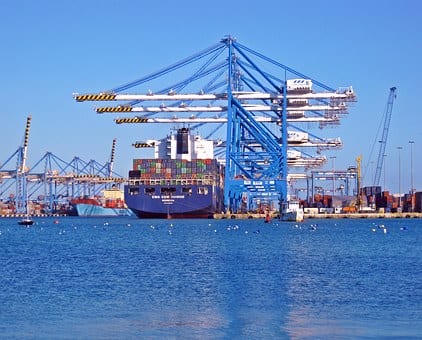
Shipping freight in containers across the ocean is one of the most common ways that importers and exporters do business. Unfortunately, some countries have confusing surcharges that are applied to this practice of ocean freight carrying. So, understanding the tax laws that the Indian government enforces, such as tax deduction at source (TDS), is vital to ensure a seamless freight transfer.
Can you deduct tax deduction at source (TDS) on ocean freight? If the payment is being made to the agents of the shipping who are non-residents of India, the TDS is calculated by looking at that shipping agent’s country of origin. The shipping agent’s taxation laws are considered to avoid double taxation. However, if the shipper is a resident shipowner, the deduction of TDS is attached to the freight payment.
TDS regulations can be confusing, even when both parties in the transaction are from India. When international sales are figured, the regulations from the Income Tax Department of India get even more confusing. Read on to find out more about TDS on ocean freight.
What Is Deducting TDS on Ocean Freight?
When any resident of India is involved with a transaction that generates income, there is an income tax that is added as a percentage to the deal. According to the New York State Society of CPAs, the United States charges a 4% tax (also known as TDS in other countries) on foreign-owned ships that get income from U.S. voyages per the U.S. law IRC sections 863(c)(2)(A) and 887(a). Ocean freight is a service that a carrier is taking part in, so the shipper must deduct the TDS on the ocean freight carrier service.
However, the percentages of deduction are not simple, since most ocean freight is made by those who are non-residents. Various provisions and rates of TDS taxation apply to the different countries of origin of those operating the vessels that are carrying the ocean freight.
These rates are detailed from a ClearTax article as a percentage TDS below for each country that India does business with:
- United States of America – 15%
- United Kingdom – 15%
- Canada – 15%
- Australia – 15%
- Germany – 10%
- South Africa – 10%
- New Zealand – 10%
- Singapore – 15%
- Mauritius – 7.5% to 10%
- Malaysia – 10%
- UAE – 12.5%
- Qatar – 10%
- Oman – 10%
- Thailand – 25%
- Sri Lanka – 10%
- Russia – 10%
- Kenya – 10%
What Is TDS?
According to the Income Tax Department of India, TDS is tax deduction at the source which takes on various other names in other countries, such as “pay-as-you-go” income tax in the United States. TDS aims to place a tax on income sources, such as person to person sales and transfers.
The idea is that the charge is situated at the source of the transaction, and the percentage of the deal is taken and placed in a government account. Whoever is being taxed at the source of income is later entitled to get a credit based on the transaction and the tax that resulted from it.
What Is Ocean Freight?
Ocean freight is a cost-effective option for shipping goods from one country to a nother. The large shipping containers that products are kept in are generally safe and secure and relatively inexpensive. The ocean freight carrier can be the owner of the ship or a forwarder who is not operating the boat.
nother. The large shipping containers that products are kept in are generally safe and secure and relatively inexpensive. The ocean freight carrier can be the owner of the ship or a forwarder who is not operating the boat.
Advantages of Ocean Freight
There are several advantages to using ocean freight, such as:
- Cheaper than other carrier methods: When you ship goods on an ocean carrier, you are using shipping containers. Most ocean carriers can transport nearly 12,000 containers on them, each with a payload of well over sixty-thousand pounds, according to the maritime carrier Costamre Inc.
- Can transport heavy items: Carriers that use ocean transport have a much higher weight restriction than other carrier methods, such as trucks or airlines. Ocean freight carriers are a great option if your products are heavy.
- Eco-Friendly: Since ocean liners with freight shipping containers can transport so much freight at once, they are the most eco-friendly option when it comes to cargo.
- Save money on TDS: If the operator of the carrier ocean liner with your freight is a non-resident of India, you will not be required to pay the TDS tax to the Income Tax Department of India.
Why Don’t You Need to Deduct TDS on Ocean Freight
Some ocean freight will not require you to deduct the TDS tax from the shipping process. This is known as the Double Tax Avoidance Act (DTAA) vs. Income Tax Act. The DTAA specifies that if you are paying a non-resident for services (such as a carrier for your freight), the Indian government will consider the amount of taxes you will pay to the operator of the freight shipping vessel to avoid double taxation.
How Is TDS Calculated?
TDS is part of the Tax Act of 1961 section 194c that reads, “any person responsible for paying any sum to any resident for carrying out any work…deduct an amount equal to” several considerations that the Indian government has detailed in the section, including:
- 1% of the transaction when payment is made to a Hindu family
- 2% of the deal when the payment is made to a non-Hindu family.
The Income Tax Department of India deems that any “person,” referred to in the Tax Act and section 194c means that you could be any:
- Government
- Establishment
- Company or firm
- Schools or universities
- Someone’s trust
Any entity which you do business with will require a TDS tax to be placed on the transaction in various percentages.
What Are the Controversies with Ocean Freight in India?
Charging a percentage on the income of a transaction is known as a surcharge. The Indian government uses this as a form of taxation, but many in the shipping industry are becoming increasingly upset about this surcharge practice.
The Container Shipping Lines Association (CSLA) said in a recent article of the Journal of Commerce(JOC) that, since 2016, their efforts to streamline the business of ocean freight had been hindered. Also, since the advisory of cargo is riddled with inconsistencies, Shipping Minister Mansukh L. Mandaviya blamed the advisory of the taxation laws for “increase in dwell time and also increases the cost.”
The shipping industry via ocean freight is economically the best option. However, with these surcharges being placed on shipments and the geopolitical climate with things like trade wars and Brexit going on, India faces a significant uphill battle. It is no wonder that people are questioning how and when TDS needs to be paid.
In Conclusion
The deduction of TDS is always needed when the carrier of the ocean freight is a resident of India. However, if the carrier operating the vessel of ocean freight is a non-resident of India, there are percentages of deduction that go into place depending on the country of origin of the operator of the vessel doing the ocean freight carrying.
These percentages are known as the Double Tax Avoidance Act. Even with this provision for avoiding being taxed more than necessary, the associations involved with shipping from the country of India are clamoring for a more competitive pricing and market system for ocean freight shipping.
Given that these sources are from April 2020, the geopolitical pressures being felt by the country and the Income Tax Department of India are worldwide. These pressures have been mounting since 2016 and will continue to be a point of trouble going forward.
Sources:
Income Tax Department of India



